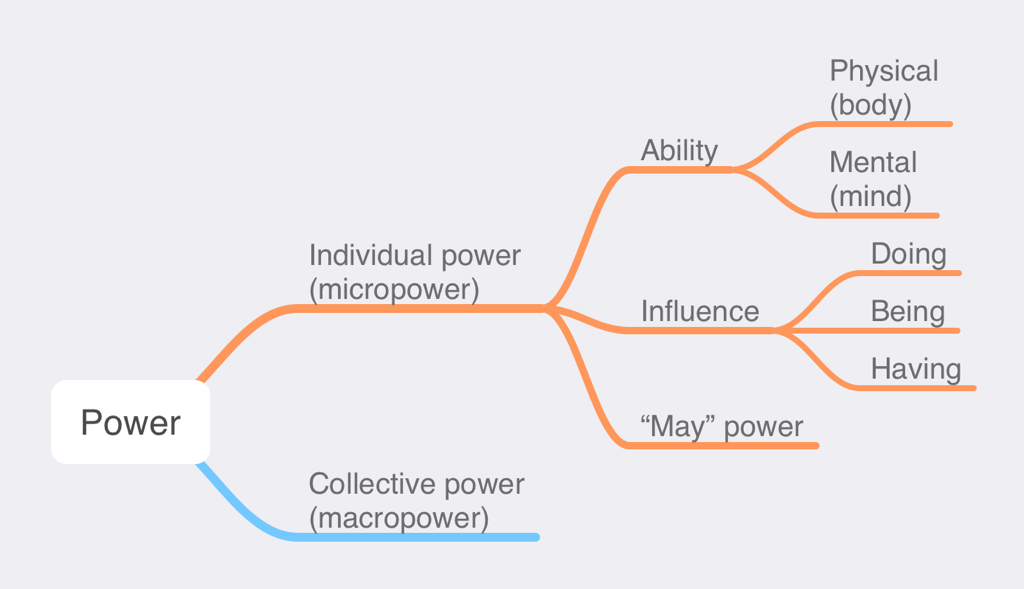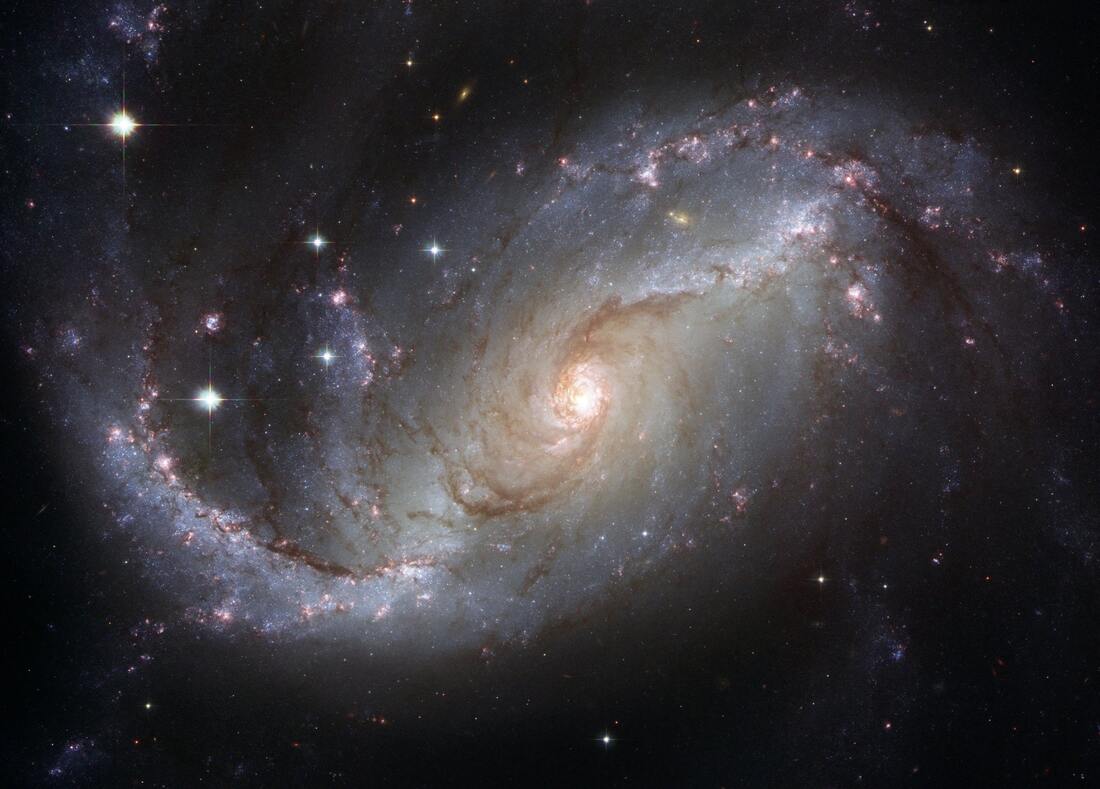- About
- Introduction
-
Browse the book
-
All the pages alphabetically
>
- A >
- B >
- C >
- D >
- E >
- F >
- G >
- H >
- I >
- L >
-
M
>
- Main theories of power
- Making an effort is a prerequisite of using power
- Marxism and the meaning of power
- "May" power
- Meanings of power that are not directly related to social power
- Micropower: Individual power
- Mindfulness
- Media and Digital Literacy as Forms of Individual Power
- (Mis)understanding of power in media texts
- Money and Power
- My synesthetic perception of "power"
- N >
- P >
- R >
- S >
- T >
- U >
- V >
- W >
- Completed pages
-
All the pages alphabetically
>
- Author
What Is Power?
(completed pages might be rewritten over time)
Obviously, one can look for a definition of power in a dictionary. For example, here. However, understanding power requires more than just reading a Merriam-Webster entry. For starters, the word "power" has many meanings. Having read a dictionary entry, one might rightfully ask, Why do some definitions of power describe people and their relationships, while other definitions seem to have nothing to do with people, such as magnification or order of angels in Christianity?
In this project, my focus will be mostly on what I call social power, which exists through people's actions and relationships. At the same time, I believe that it is worth exploring the meanings of power that are not directly related to people and relationships between them. Arguably, such exploration can help us better understand how human beings make sense of themselves, for there must be a reason why the word “power” acquired these additional interpretations. I will explore the "non-social" meanings of power here.
To clarify, this page will not give you an ultimate answer to its title question. Many books have been written about power; answers formulated by different scholars complement each other in important ways. This entry is the first stepping stone that will introduce the reader to my own exploration.
This page will provide only a subjective definition created by me. Moreover, it is a definition-in-progress: I am going to refine and modify it as I am working on this hypertext book, which may take a few years.
I believe that, first of all, it is essential to understand what power is not: it is not a thing. Language forces us to refer to power as "it", which suggests that we see power as a kind of an object or entity that we can have/lack/use/find/give, or that can affect us when other have and/or use it. It is not wrong to see power as something that one can have or lack. (In a different entry, I explain that one aspect of social power – I call it micropower – is a combination of abilities and influences that describe individuals and their relationships.) However, power is more than something that one can have, lack, use, etc. Another aspect of power is something that cannot be owned by individuals, but, for the lack of better words, owns individuals or reveals itself through them (I call it macropower). Both aspects of power exist simultaneously and through each other. My theory of micro- and macropower introduce in the book Media Is Us will further explore this paradox.
In this project, my focus will be mostly on what I call social power, which exists through people's actions and relationships. At the same time, I believe that it is worth exploring the meanings of power that are not directly related to people and relationships between them. Arguably, such exploration can help us better understand how human beings make sense of themselves, for there must be a reason why the word “power” acquired these additional interpretations. I will explore the "non-social" meanings of power here.
To clarify, this page will not give you an ultimate answer to its title question. Many books have been written about power; answers formulated by different scholars complement each other in important ways. This entry is the first stepping stone that will introduce the reader to my own exploration.
This page will provide only a subjective definition created by me. Moreover, it is a definition-in-progress: I am going to refine and modify it as I am working on this hypertext book, which may take a few years.
I believe that, first of all, it is essential to understand what power is not: it is not a thing. Language forces us to refer to power as "it", which suggests that we see power as a kind of an object or entity that we can have/lack/use/find/give, or that can affect us when other have and/or use it. It is not wrong to see power as something that one can have or lack. (In a different entry, I explain that one aspect of social power – I call it micropower – is a combination of abilities and influences that describe individuals and their relationships.) However, power is more than something that one can have, lack, use, etc. Another aspect of power is something that cannot be owned by individuals, but, for the lack of better words, owns individuals or reveals itself through them (I call it macropower). Both aspects of power exist simultaneously and through each other. My theory of micro- and macropower introduce in the book Media Is Us will further explore this paradox.
Image credit: Pixabay
Power is not a thing – it is an inalienable aspect of being human. It is an aspect of all human relationships. Manifestations of power can be seen on the micro level of relationships between specific individuals (micropower), as well as on the macro level – the social universe – where power is not owned by any individual in particular but is shaped by everybody and affects everybody (macropower).
The workings of micro/macro power can only be understood through analysis of the social universe – that is, by exploring its specific aspects. Moreover, it is possible that the question "What is power?" can be only answered through analysis, but not through synthesis. What I mean is that – as I suspect – power can be only partially understood by the human brain as we look at its forms and aspects, just as human beings can only partially understand themselves. However, I believe that even this incomplete process of getting closer to understanding power can be beneficial as we are looking for ways to deal with flaws of social coexistence (e.g. inequality).
Power is not a thing – it is an inalienable aspect of being human. It is an aspect of all human relationships. Manifestations of power can be seen on the micro level of relationships between specific individuals (micropower), as well as on the macro level – the social universe – where power is not owned by any individual in particular but is shaped by everybody and affects everybody (macropower).
The workings of micro/macro power can only be understood through analysis of the social universe – that is, by exploring its specific aspects. Moreover, it is possible that the question "What is power?" can be only answered through analysis, but not through synthesis. What I mean is that – as I suspect – power can be only partially understood by the human brain as we look at its forms and aspects, just as human beings can only partially understand themselves. However, I believe that even this incomplete process of getting closer to understanding power can be beneficial as we are looking for ways to deal with flaws of social coexistence (e.g. inequality).
If you are interested in getting updates about this project (e.g., when new pages are published), please sign up for the newsletter on my main website.
THIS WEBSITE CONTAINS NO AI-GENERATED CONTENT
- About
- Introduction
-
Browse the book
-
All the pages alphabetically
>
- A >
- B >
- C >
- D >
- E >
- F >
- G >
- H >
- I >
- L >
-
M
>
- Main theories of power
- Making an effort is a prerequisite of using power
- Marxism and the meaning of power
- "May" power
- Meanings of power that are not directly related to social power
- Micropower: Individual power
- Mindfulness
- Media and Digital Literacy as Forms of Individual Power
- (Mis)understanding of power in media texts
- Money and Power
- My synesthetic perception of "power"
- N >
- P >
- R >
- S >
- T >
- U >
- V >
- W >
- Completed pages
-
All the pages alphabetically
>
- Author

